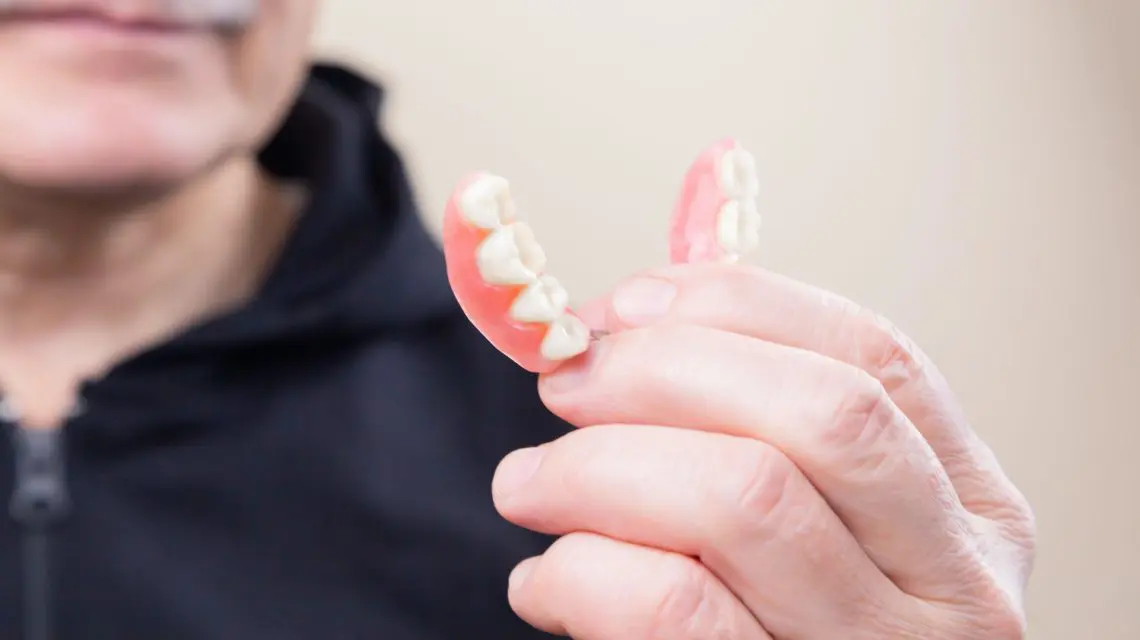Whether you’re considering getting dentures or just got a new set, you may have some concerns about what to expect. Dentures have a reputation for being slippery and uncomfortable. But in reality, dentures just take a little getting used to—they become more comfortable and stable with time.
During the adjustment period with new dentures, you may experience some issues such as soreness and difficulty eating and speaking. Luckily, these issues should go away with proper care and some patience. In the meantime, here’s how to deal with the most common problems associated with dentures.
Five Common Denture Problems and Their Solutions
1: Trouble Talking or Chewing with Dentures
It takes some time and practice to be able to eat and speak comfortably with dentures. If you just got your first dentures, you can expect it to take about a month for your mouth to fully adjust.
To help with eating, stick to soft foods for the first few days after getting dentures. And when you switch back to solids, cut the food into small pieces so you can chew it easier. If you have problems with your dentures falling out while eating, try chewing evenly with both sides of your to make the dentures more stable.
To practice talking, try reading out loud every day to help you get better at speaking while wearing your dentures. But if you still have difficulty chewing or talking after several weeks of practice, don’t hesitate to contact your dentist. Your dentures may need an adjustment to help you feel more comfortable.
2: Dentures Slipping Out
It’s normal for dentures to occasionally slip out when you first get them, because your mouth’s muscles are still adjusting to holding them in place. Using a denture adhesive and regularly practicing speaking and eating with your dentures will help keep them firmly in place. If your dentures are constantly loose, however, contact your dentist to have them adjusted.
3: Gum and Mouth Pain
The idea that dentures are always uncomfortable is a myth, but it’s also normal to experience some discomfort as you adjust to wearing new dentures. To relieve irritation, try mixing one teaspoon of salt in an 8-ounce glass of warm water, rinse and swish for 15-30 seconds, then spit.
Soreness from new dentures should only last a few weeks—any pain or sores that last longer could be a sign that your dentures don’t fit properly, so make an appointment with your dentist if the discomfort continues.
4: Excess Saliva
Another common issue with new dentures is excess saliva production. This is your body’s natural response to a foreign object in the mouth. Over time, your salivary glands will become less active and stop producing so much saliva.
In the meantime, avoiding dry, sugary, and sour foods can help reduce saliva production until your mouth has fully adjusted. Again, it’s essential to visit your dentist if the problem persists.
5: Infections from Dentures
Failing to keep your dentures clean can cause mouth infections such as angular cheilitis (inflammation of the lips) and stomatitis (general mouth inflammation). Treatment for infections may include antibiotics, ointments, anti-fungal medication, or laser therapy.
You can prevent infections from dentures by following these tips to keep your dentures clean:
- Brush your dentures daily with a denture brush.
- Clean your gums, tongue, cheeks, and the roof of your mouth every day with a soft-bristled toothbrush.
- Remove and rinse your dentures after you eat.
- Soak your dentures overnight in water or a denture cleaning solution.
- Rinse your dentures before putting them back in your mouth.
Removable Dentures in Flagstaff, Arizona
Dentures are an excellent solution for replacing missing teeth and restoring your ability to speak, chew, and smile.
If you think dentures are right for you, contact Country Club Dental. We provide durable, natural-looking custom dentures in the Flagstaff community. When you get your new dentures, we’ll discuss the best ways to avoid the most common issues associated with the adjustment period.
Call our office at 928-526-4314 today to schedule an appointment with Dr. Paul Whitney.
Images used under creative commons license – commercial use (6/7/2023). Photo by Diana Polekhina on Unsplash


